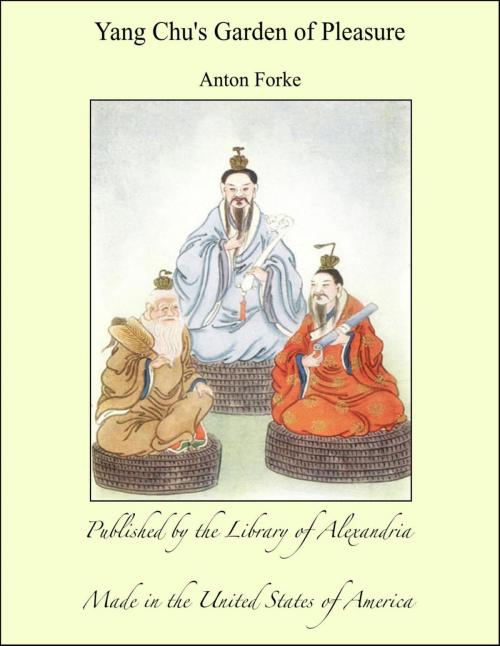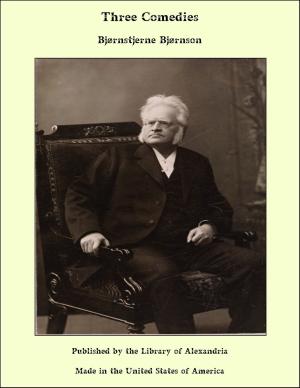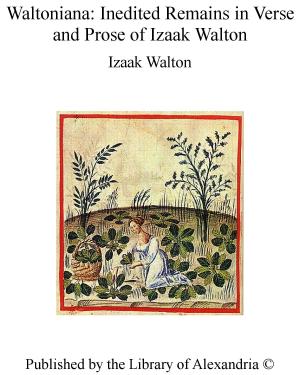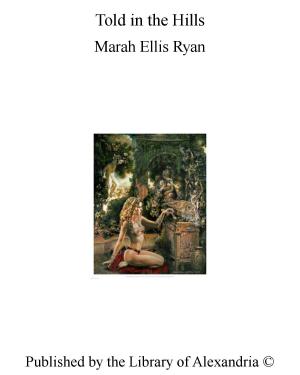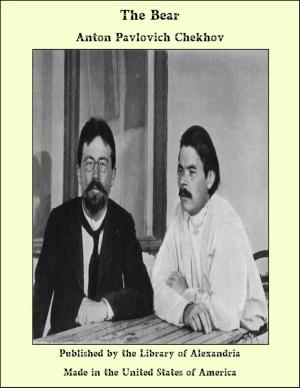Yang Chu's Garden of Pleasure
Nonfiction, Religion & Spirituality, New Age, History, Fiction & Literature| Author: | Anton Forke | ISBN: | 9781465577603 |
| Publisher: | Library of Alexandria | Publication: | March 8, 2015 |
| Imprint: | Language: | English |
| Author: | Anton Forke |
| ISBN: | 9781465577603 |
| Publisher: | Library of Alexandria |
| Publication: | March 8, 2015 |
| Imprint: | |
| Language: | English |
THE period of the Warring States of the Western Chinese Empire, 480 to 230 B.C., embraces practically (almost) all of the philosophies of China, and is curiously coincident with the rise of philosophy in Greece under somewhat similar conditions. To the capital of Liang, in the State of Wei, came all the philosophers, just as they came to Athens. Here came Mencius, perhaps one of the greatest of the exponents of Confucianism, a veritable St. Paul of the Confucian movement, and the chief opponent of Yang Chu. Here came Chuang-Tzŭ, most subtle among the Taoist sophists, Li Kuei the great statesman and law-giver, Hsün-tzŭ the philosopher of the doctrine of original evil, Wênt-zu the able follower of Lao-tzŭ, and Mo-Ti the apostle of brotherly love, whose name is frequently bracketed with Yang Chu in condemnation by Mencius. Seldom had any capital in the world attracted so many profound original and subtle thinkers as the capital of the State of Wei, in the third and second centuries before Christ. The spread of Christianity in Eastern Europe, and Confucianism in China, ultimately destroyed or diverted the philosophic spirit, substituting religious dogma and rites for philosophic inquiry and reason, and for centuries the the philosophies lay buried or perished altogether in the great burning of the books in 213 B.C., or passed, like Taoism, into the realms of rites and worship, or were preserved only in fragmentary form, like the single chapter of the philosophy of Yang Chu, that remains imbedded in the Taoist teachings of Lieh Tzu. But in the third and fourth centuries B.C., the golden period of Chinese philosophy, the minds of men were turned to the critical examination of life. Philosophers rose, exploring boldly the motives and mysteries of existence, gathered around them disciples, and went from court to court, gaining fresh adherents and disputing with rival teachers on the most diverse and subtle of subjects.
THE period of the Warring States of the Western Chinese Empire, 480 to 230 B.C., embraces practically (almost) all of the philosophies of China, and is curiously coincident with the rise of philosophy in Greece under somewhat similar conditions. To the capital of Liang, in the State of Wei, came all the philosophers, just as they came to Athens. Here came Mencius, perhaps one of the greatest of the exponents of Confucianism, a veritable St. Paul of the Confucian movement, and the chief opponent of Yang Chu. Here came Chuang-Tzŭ, most subtle among the Taoist sophists, Li Kuei the great statesman and law-giver, Hsün-tzŭ the philosopher of the doctrine of original evil, Wênt-zu the able follower of Lao-tzŭ, and Mo-Ti the apostle of brotherly love, whose name is frequently bracketed with Yang Chu in condemnation by Mencius. Seldom had any capital in the world attracted so many profound original and subtle thinkers as the capital of the State of Wei, in the third and second centuries before Christ. The spread of Christianity in Eastern Europe, and Confucianism in China, ultimately destroyed or diverted the philosophic spirit, substituting religious dogma and rites for philosophic inquiry and reason, and for centuries the the philosophies lay buried or perished altogether in the great burning of the books in 213 B.C., or passed, like Taoism, into the realms of rites and worship, or were preserved only in fragmentary form, like the single chapter of the philosophy of Yang Chu, that remains imbedded in the Taoist teachings of Lieh Tzu. But in the third and fourth centuries B.C., the golden period of Chinese philosophy, the minds of men were turned to the critical examination of life. Philosophers rose, exploring boldly the motives and mysteries of existence, gathered around them disciples, and went from court to court, gaining fresh adherents and disputing with rival teachers on the most diverse and subtle of subjects.
